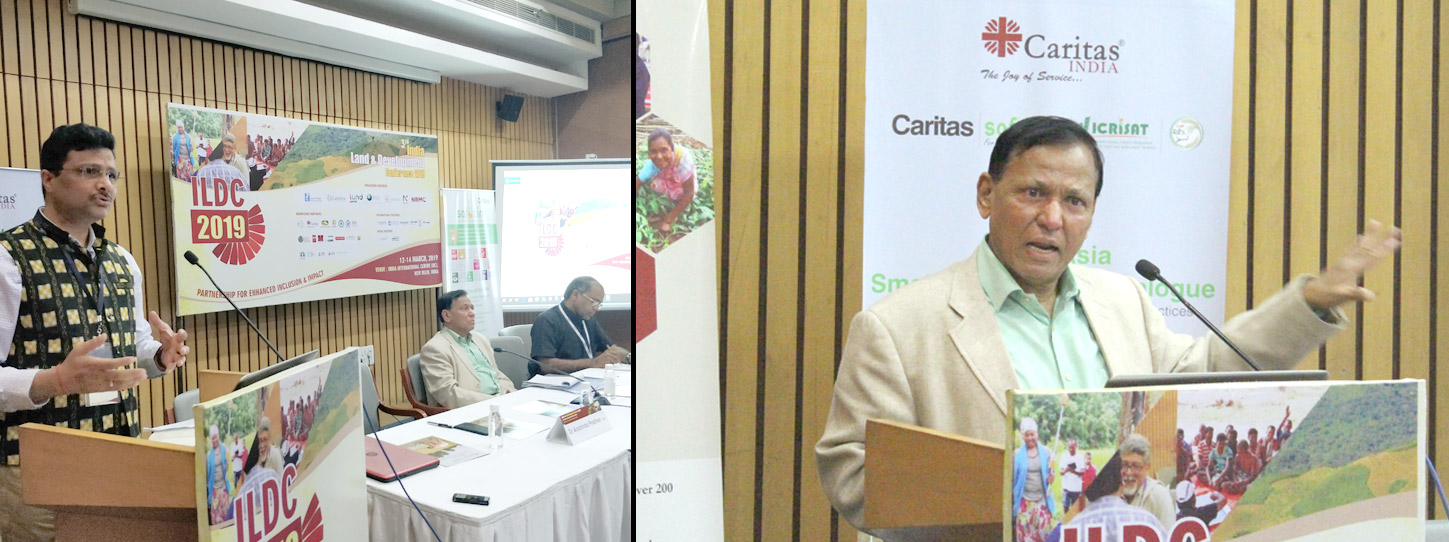
“People, Planet, Prosperity, Peace, and Partnership are the streams that run across the Sustainable Development Goals which should be a livewire of all our engagements with the smallholder farmers”, emphasized Fr. Paul Moonjely, Executive Director of Caritas India during the second series of policy dialogue jointly organized by Caritas India, the International Crop Research Institute (ICRISAT), and the Centre for Agricultural Policy (CAP), which took place during the third India Land and Development Conference 2019 in New Delhi on March 13. Fr. Paul calls for demystifying terms like SDGs and start using the terminologies of the farmers. “Smallholder farmers make up the majority of the poor in the world – so do they in India. But they produce the good food we eat. Thus, every time we eat, one should think about a farmer; and every time we make a policy, the policy makers should think about smallholder farmers too”, said Mr. Sunil Simon, Head of SARE, the regional unit of the Smallholder Adaptive Farming and Biodiversity Network (SAFBIN) in South Asia during his opening speech at the policy dialogue. This policy dialogue took place to provide centre stage to the smallholder farmers in research and action around food and nutritional security, policies, and the mainstream discourse. The policy dialogue aimed at mainstreaming smallholder agenda in the policies and regional cooperation mechanisms in South Asia. Along with enabling small-farmer-led local actions and meso-level research, extension market partnerships, this was an effort to also engage at macro and regional policy environment and stakeholders through a comprehensive approach. Such multi-level and multi-stakeholder engagements are crucial to achieve relevant SDGs.
The status quo is well known. Smallholder farmers have poor access to land and water resources with highly unsecure land tenure. At the same time, smallholder farmers belong to the most vulnerable and marginalized. Moreover, 25 million hectares of land is left fallow in India – a huge chunk of land that could be used productively.
However, while science is clear about it, there has been very limited attention and actions in policy and practice on this key structural democratic state, equality provisions in the constitutions dimension of small farming.
Panellist Dr. Arvind Padhee on the other hand, Director of Country Relations and Business Affairs at ICRISAT, is very clear about what needs to be done: First, land leasing needs to be legalized as soon as possible. The land leasing model proposed by Haque Committee Report has largely not be implemented – we have to start prescribing it. And second, an update and digitalization of land records have to be followed by land titling.
Land reforms are a must in order to double small farmers income and achieve SDGs. He states that we need to invest 640,000 crore Rupees, excluding all the subsidies to double farmers income. The great need for capital also demands for farmer’s investments, but the current lack of formal contracts clearly disincentives farmers to invest. However, empirical evidence shows: Tenure security would lead to increased investments of farmers.
Dr. T. Haque, former Chair at Land Cell, Niti Ayog, adds that land reforms also lower the dependency on on-farm activity of smallholders. In fact, with land reforms in place, farmers can take up more off-farm activities and thus diversify their risks. Vietnam and other Asian countries showcase the great potential of land reforms as a powerful instrument, not only for food production, but also as a game changer in the overall economic growth of the country. Dr. T. Haque states that 3% GDP is lost for not having clear land titles. Similarly striking is the next figure he raises: Applied land rights for women can reduce global poverty by 20%.
This all shows: The potential of land tenure security is enormous. To ensure sustainable production and therefore to ensure food and nutritional security, long-term access and control over land is key for smallholder farmers. Using arable land kept fallow productively, can contribute substantially. At the same time women will be empowered, and livelihoods of smallholders will improve. A true game changer indeed.
The following recommendations for land policy reforms to double small farmers income and achieve SDG were shared with the political and media representatives during the “Political Forum Session” during the 2019 India Land and Development Conference (ILDC):